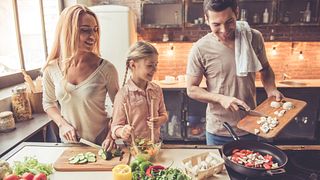Rethink The Ranch
Home on the range...and in the pasture, and at the feedyard. Raising beef is a complex process, but throughout the entire journey, one thing remains constant – the shared commitment to raising cattle in a safe, humane and environmentally sustainable way.
There are more than 9,000 cattle farms and ranches in The Evergreen State, with an average herd size of 40 cattle. Learn more about the people and the process involved in raising beef from the pasture to the plate.
from ranch to (climate pledge) arena
See how Royal City farmer & rancher Austin Allred and Executive Chef Molly DeMers of Climate Pledge Arena are putting beef boldly on the menu.
WiDE-OPEN SPACES, for cattle and outdoor enthusiasts
In the foothills of the North Cascades, Nicole Kuchenbuch and her family raise cattle at Haeberle Ranch Inc. and strive to preserve and protect rangeland, open space and wildlife habitat for this generation — and beyond.
Veterinarians and cowboys
When it comes to raising beef cattle, veterinarians play a key role in the care of cattle at every stage. Proactive teamwork between veterinarians and farmers and ranchers results in great cattle health and well being. Meet a few of the many dedicated bovine (cattle) veterinarians who play a key role in cattle care.
HOW CATTLE CAN HELP
Raising cattle can improve the environment they live in, right down to building the plants and soil under their hooves, where carbon emitted from all sectors of industry can be stored, preventing climate changing gases from warming the atmosphere.
First generation Ellensburg area rancher Kyler Beard dives into the practices that make this possible. Take this two minute opportunity to learn more about the work that ultimately culminates into the burgers and steaks on our plates and why he believes, "cows are gonna save the planet."
It's a Cool Job
The stewardship that starts on the ranch, continues where cattle spend that last few months finishing at a feed yard. The care performed by well-equipped crews and the efficiencies captured results in beef that is lighter on resources overall. That means less emissions, water, and land used per pound of beef produced.
Probably the most powerful part of it? The untold tons of byproducts from locally grown and processed foods, drinks and energy for people bypass becoming landfill waste because these safe-for-cattle-consumption feedstuffs are upcycled into protein-rich beef. "You're welcome," - cattle, probably.
CaTTLE AND CLIMATE SCIENCE
According to the researchers at the University of California Davis CLEAR Center, cattle can be climate neutral, and efforts are under way to achieve this. “Animal agriculture is one of the few industries that can pull carbon out of the atmosphere,” Dr. Frank Mitloehner says. “That puts it in a position to help mitigate the effects of other industries once it achieves climate neutrality.”
Read the Geekwire article to learn more about the potential cattle and farming practices have in combatting today's climate problems.
O.G. Environmentalists
Third generation rancher Jim Rose has been raising cattle on the same land near Bay Center, Washington his entire life. “People don’t understand how much ranchers are already environmentalists, and have always been,” says Jim. “If you don’t take care of your environment, you’ll be out of business — that’s a hell of an incentive to do a good job. Ranchers need to take care of their land, and they know that. Or they don’t have a business.”
Get a deeper understanding of what Jim means by reading about how the family practices land stewardship while raising their cattle and running a business.
5 facts about beef and the environment
Are cattle the climate change culprits they're often made out to be? Get the answer, and four more facts about raising cattle and what that means for our environment. Explore the lesser known ways beef makes our food supply more sustainable through learning about the practices of real Washington ranchers and cattle feeders.
Sustainable Beef
Are cattle a leading cause of climate change? Spoiler Alert: They aren't. But the people raising cattle do care a lot about our environmental impact. Allow us to expand on the science behind that while sharing more about how cattle ranchers are always looking to become more efficient and lower impact.
Pasture To Plate
Have you ever visited a cattle ranch? A feed yard? Did you know that ALL beef cattle spend about half their life with their mothers, eating grass? Get a better understanding of how beef is raised through the stories of a few of the roughly 9,000 family farmers and ranchers who raise beef here in Washington.
Meet Your Ranchers
See Jane Ranch
Klickitat County rancher Jane Lee is a force of nature. Whether it's helping a mother cow have a calf or saving a hiker off the side of a mountain, she's up to the task. Her super power is helping others, and this influential woman is passing it down to the next generations at Lee Ranch.
The Ultimate Locavore
The cattle at El Oro Cattle Feeders in Moses Lake are healthy locavores. They enjoy the leftovers from many of Washington's agricultural crops including potatoes, grains, and grasses. The yard's horseback cattle health experts take care of the rest, checking on every animal, every day.
